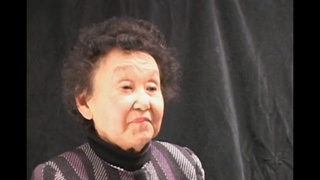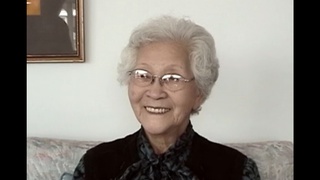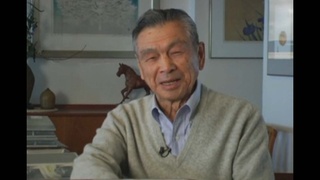Interviews
Father's Sacrifice
The only work that he could get, and a lot of the Issei men could get, was working at this place called Darlings, which processed the deceased animals of the surrounding farm lands. And they'd bring this huge cow in, and I can remember. They'd hook up chains to it, and they would just take the skin right off. It was an amazing sight. And they would bring the skins down to the basement to be tanned and cured into hides. And that's where my father worked. Fortunately, I never got to work there. All my brothers worked there during the summer for summer jobs.
This place was hell. I cannot describe it as anything else but hell. On summer days, when a smoke stack was cranking full, it would just blanket the whole city of Chatham in this God-awful stench. McGregor Creek, which was a stone's throw away from our house, you couldn’t see the water because there was that much scum on it. That was long before there was consciousness of pollution and ecology and all this stuff. Now you couldn't get away with it.
I only went there once when my mother said, “Take your father this bento, this dinner because he's working late.” So I said okay, jumped on my bike, pedaled down. And I took the bento and I walked down the basement, the concrete steps, into his work place.
And it was like, god. It was filthy. It was stacked with skins, layered with salt. There was blood and brine swooshing to the floor. The walls were splattered with the gore and the stench was overpowering. It was almost like another dimension, it was so powerful. And so he came out and he was dressed in this black rubber apron with black gum boots and there were knives tucked into his waistband. And I don't know. He just looked so tired. He just looked so dead tired, like his life was going down the drain, with all the terrible other refuse of the workplace. So I handed him his dinner and I split. I mean, I ran out of there, because if I stayed there another second, I would have gotten sick, and I would have added my vomit to that already disgusting floor. And that was his life.
Now he died when I was at that stage where I was trying to establish my own identity and it was the natural progression of things, where I'm rebelling. And I’m rebelling against him because he was a very stern, oppressive person. I can't remember a very warm, father-son relationship with him because he was an Issei. He was an Issei male, and they didn't show emotion very much. Although I'm sure he loved me, and he loved us as family, because how else could he rise those many mornings to enter that hell hole.
So he died and my one regret is that I never got a chance to say to him that, okay man, I realize now the magnificence of your courage in entering that basement those many mornings so that we could have a better life.
Date: February 9, 2011
Location: California, US
Interviewer: Patricia Wakida, John Esaki
Contributed by: Watase Media Arts Center, Japanese American National Museum










